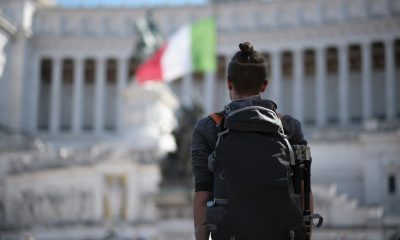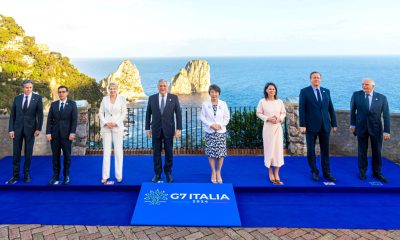EU
Yon nouvo ekilib politik pou #Ewòp


The EU is at a dead end. It does not have any solutions for the big challenges the continent is facing. Europe needs a new direction, but the question is which direction, writes MEP Bernd KÖLMEL, ECR (DE).
The citizens are disillusioned, disheartened and feel disenfranchised. There is no vision for the future. Communities across Europe are faced with problems of Europe’s making, such as the migration and refugee crisis, the permanent euro crisis, the high level of unemployment and the fear of rise of terrorism. The European Institutions are of course solely responsible for this sad state of affairs. A series of independent and interlinking factors has precipitated the electorates crisis in confidence in the elites and transformed the EU and the politicians into the target of harsh criticism.
Many established politicians have overloaded their speeches with promises that “the EU will create jobs for every citizen”, “the EU can get your children better education”, “the EU will set fair conditions for all”. These unfounded promises that the Brussels elite have been making for decades have gone unfulfilled. And voters have tired of empty promises and turned their backs on the project. The voters do not trust the old governance structures of those that have inhabited them. This is epitomized by the recent success of the Five Star Movement in the Italian elections, the Alternative für Deutschland in the German federal elections last September, and the decision of the UK voters to leave the EU. We need to acknowledge that the current EU is not going in the right direction. We need to make changes or changes will happen to us in the next elections.
There are two (very different) roads to change. Do we want more self-determination for nation states and citizens and the economy with the associated consequences; or, do we want to have a strong centralized European “state” or empire which will manage (and finance) what is necessary? Politicians from across the spectrum and experts from many fields will meet at the Brussels Summit on 22 March, to which the public has been invited, to discuss which one of the two roads we should take. What course will overcome the challenges the EU faces today and presents an alternative vision of a reformed EU.
In the last decade the EU and the key member states have been on a one-way path to give the EU project more and more responsibility and power. This is the wrong way. Because this led to a nanny state where everybody is looking for subsidies, protection and financial support from the public. This has weakened our competitiveness and the engagement of the citizens. And it has damaged the trust in governments that have been overwhelmed and confronted with a race to the bottom.
Instead we need learn from industry - government needs learn management. We shouldn´t regulate what the nations, communities or citizens can do themselves; only cross border issues need this type of rule. This will give space for companies to develop. Governments must set fair and transparent conditions for SMEs, start-ups and citizens which should and must be respected by the EU. And it must strongly take action to get respect for those rules that are absolutely necessary. Sounds easy, but is it?
History dictates that theory is different from practice. For example, in relation to the rules on the Euro, the treaty of Maastricht isn´t worth the paper it is written on - Member States have repeatedly disregarded the contract without any consequences for the actors. The rules the European Union put in place for asylum seekers, refugees and free movement by the Dublin Regulation and the Schengen Agreement are good ideas, but in practice they are far from functional. For decades the EU promises a fight against bureaucracy, but fight apparently always fails, because the result has been more bureaucracy.
Democratic accountability needs transparency. Voters don´t understand who in the EU is responsible for what, so how can a citizen make an informed decision to vote? In Malta an MEP is responsible for 57.000 voters, in Germany he is responsible for more than 600.000 voters. This shows that the EU needs to be rebalanced.
Brexit is the bad thing not only for the UK, but for the EU as a whole. We need to take this opportunity to reform the EU. Otherwise it will in the future be dominated by the “Club Med” (the member states in the Mediterranean region) that wish to increase public spending and more intervention and regulation. We should be prepared for the possibility that these countries will have their moment, that they may get a majority in the European Parliament.
We need to prepare ourselves for the future and to chart a new course for Europe. Europe must not be allowed to fail, but fail it will if we persist in pursuing the ineffectual federalist policies of the past. Deep reform is needed in pursuit of this new course. With courage from our political leaders we can make the necessary changes, and create and new a brighter future for everyone in Europe.
Pataje atik sa a:
-

 Tabak4 jou de sa
Tabak4 jou de saPoukisa politik Inyon Ewopeyen an sou kontwòl tabak pa travay
-

 Lachin-Inyon Ewopeyen4 jou de sa
Lachin-Inyon Ewopeyen4 jou de saMete men ansanm pou konstwi yon kominote avni pataje epi kreye yon avni ki pi briyan pou patenarya toutotou Lachin-Bèljik nan koperasyon zanmitay ansanm.
-

 European Commission4 jou de sa
European Commission4 jou de saMouvman pa byen gratis yo ofri nan UK pou elèv yo ak jèn travayè yo
-

 Mwayen Oryan4 jou de sa
Mwayen Oryan4 jou de saReyaksyon Inyon Ewopeyen an nan atak misil Izrayèl la sou Iran vini ak avètisman sou Gaza






















